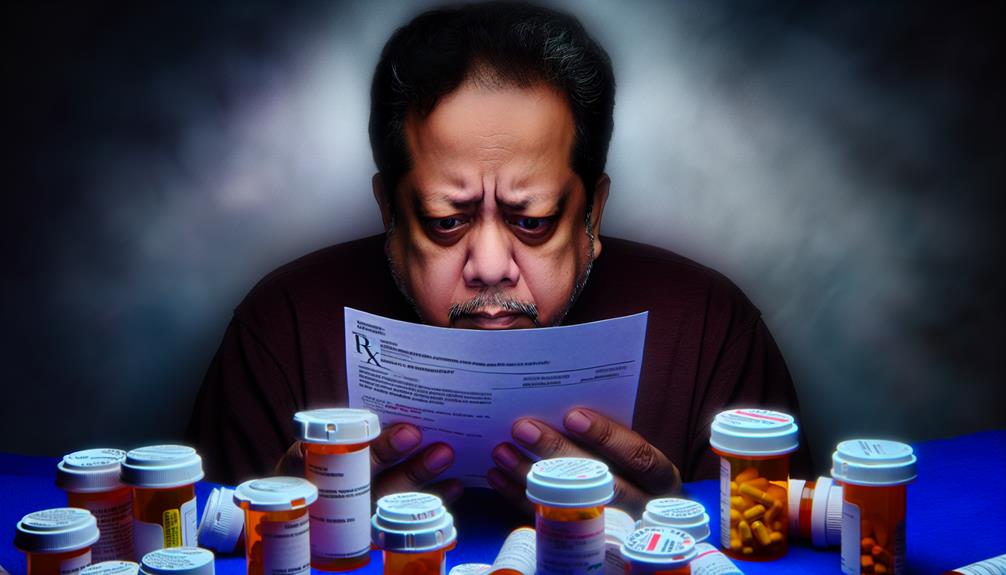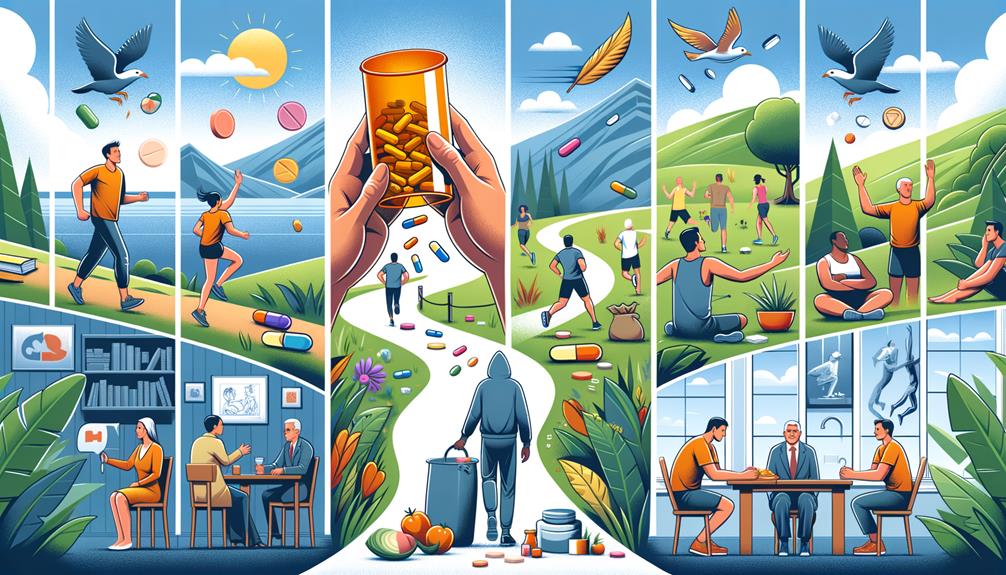Have you ever stopped to consider how prescription drug abuse has become a growing concern in today's society? It's a sobering reality that affects millions of individuals worldwide, regardless of age, gender, or background.
But fear not, for there is hope. This step-by-step guide is designed to provide you with the tools and strategies necessary to overcome prescription drug abuse and reclaim control of your life.
So, if you're ready to embark on a journey towards recovery, let's explore the essential steps together and discover a path towards a healthier, drug-free existence.
Understanding Prescription Drug Abuse

If you or someone you know is struggling with prescription drug abuse, it's important to have a clear understanding of the factors that contribute to this harmful behavior. By understanding the risk factors and implementing prevention strategies, you can help prevent prescription drug abuse and promote a healthier lifestyle.
There are several risk factors that increase the likelihood of prescription drug abuse. One major factor is a history of substance abuse or addiction. Individuals who've previously struggled with alcohol or drug addiction are at a higher risk of developing a dependence on prescription medications. Other risk factors include mental health disorders, such as anxiety or depression, and a family history of substance abuse. Additionally, easy access to prescription drugs, whether through a healthcare professional or from friends and family, can also contribute to abuse.
Prevention strategies play a crucial role in combating prescription drug abuse. Education is key, both for healthcare professionals and the general public. Healthcare providers should receive training on proper prescribing practices and the potential risks associated with certain medications. For the public, awareness campaigns can help increase knowledge about the dangers of prescription drug abuse and encourage responsible medication use. Implementing prescription drug monitoring programs can also help identify and prevent potential cases of abuse.
Recognizing the Signs and Symptoms
Recognizing the signs and symptoms of prescription drug abuse is crucial in order to intervene and provide support for individuals who may be struggling with this harmful behavior. Identifying warning signs early on can help prevent the escalation of the problem and enable timely intervention. Here are three key signs to look out for:
- Changes in behavior: Pay attention to abrupt changes in mood, energy levels, or motivation. Is the person becoming more withdrawn, secretive, or defensive? Are they neglecting their responsibilities or losing interest in activities they once enjoyed? These behavioral shifts can indicate a problem with prescription drug abuse.
- Physical symptoms: Be on the lookout for physical signs such as frequent headaches, dizziness, unsteady gait, or bloodshot eyes. Sudden weight loss or gain, poor personal hygiene, or a decline in physical appearance may also be indicative of prescription drug misuse.
- Social and interpersonal issues: Notice any strained relationships or conflicts arising within the individual's personal and professional life. Are they experiencing difficulties at work or school? Have they become isolated from friends and family? These social and interpersonal struggles may be a result of their prescription drug abuse.
Early intervention strategies are essential to addressing prescription drug abuse effectively. If you notice any of these warning signs, it's important to approach the individual with empathy and concern. Encourage open communication and offer support in seeking professional help. Remember, your intervention may make a significant difference in their journey to recovery.
Seeking Professional Help and Treatment Options

When seeking professional help and exploring treatment options for prescription drug abuse, it's important to consider your unique needs and circumstances. Professional therapy and rehabilitation programs can provide the necessary support and guidance to help you overcome this addiction.
Professional therapy, such as counseling or psychotherapy, is an essential component of treatment for prescription drug abuse. A qualified therapist can help you identify the underlying causes of your addiction and develop effective coping strategies. They can also provide a safe and non-judgmental space for you to discuss your struggles and emotions.
Rehabilitation programs are another valuable option to consider. These programs offer a structured and supportive environment where you can receive intensive treatment and learn new skills to manage your addiction. Inpatient rehabilitation programs provide round-the-clock care and support, while outpatient programs offer flexibility for those who need to maintain their daily responsibilities.
It is crucial to choose a treatment option that aligns with your specific needs and circumstances. Consider factors such as the severity of your addiction, your personal commitments, and your support system. Remember, seeking professional help is a brave and important step towards reclaiming your life from prescription drug abuse.
Developing Healthy Coping Mechanisms
Developing healthy coping mechanisms is an essential part of overcoming prescription drug abuse and maintaining long-term recovery. When you find healthier ways to manage stress and fill the void left by substance abuse, you create a strong foundation for lasting change. Here are three important steps to help you develop healthy coping mechanisms:
- Explore new hobbies: Engaging in activities that bring you joy and fulfillment can be a powerful distraction from cravings and triggers. Whether it's painting, playing a musical instrument, or practicing yoga, finding a hobby that interests you can provide a healthy outlet for stress relief and self-expression.
- Manage stress effectively: Stress is a common trigger for substance abuse, so it's crucial to find healthy ways to manage it. This can include practicing mindfulness and meditation, engaging in regular physical exercise, and maintaining a balanced lifestyle with proper sleep and nutrition. Additionally, seeking support from friends, family, or a therapist can help you develop effective stress management strategies.
- Build a support network: Surrounding yourself with a supportive and understanding network is vital for your recovery journey. Joining support groups or attending therapy sessions can provide a safe space to share your experiences and learn from others who've gone through similar struggles. Having people who genuinely care about your well-being can offer encouragement, guidance, and accountability.
Maintaining Long-Term Recovery

To maintain long-term recovery from prescription drug abuse, it's crucial to establish a solid foundation of healthy habits and strategies.
One of the most important aspects of maintaining your recovery is relapse prevention. Recognizing triggers and developing coping mechanisms can help you navigate potential pitfalls. It's essential to identify situations, people, or emotions that may tempt you to use prescription drugs and come up with alternative strategies to manage them effectively.
This may include engaging in healthy activities like exercise, meditation, or hobbies that provide a sense of fulfillment and enjoyment.
Developing a support network is also vital in maintaining your recovery. Surrounding yourself with individuals who understand your journey and can offer guidance and encouragement can make a significant difference. Consider joining support groups, attending therapy sessions, or connecting with loved ones who can provide emotional support. Building a support network not only provides accountability but also offers a safe space to share your experiences and challenges.








